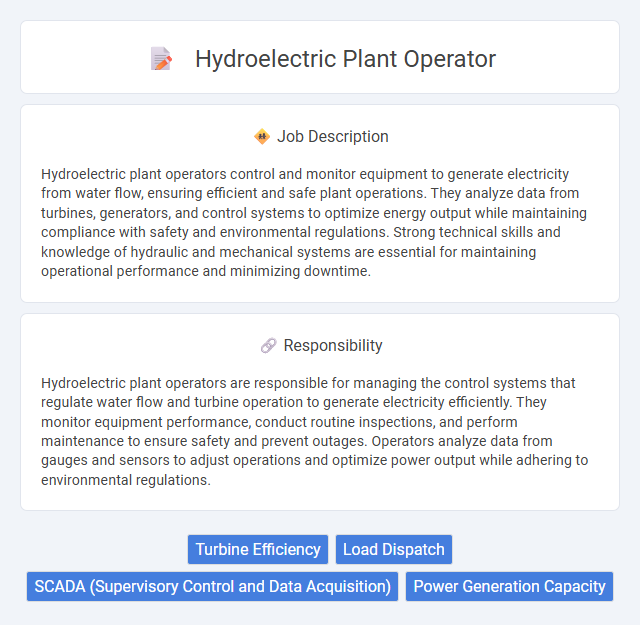
Hydroelectric plant operators control and monitor equipment to generate electricity from water flow, ensuring efficient and safe plant operations. They analyze data from turbines, generators, and control systems to optimize energy output while maintaining compliance with safety and environmental regulations. Strong technical skills and knowledge of hydraulic and mechanical systems are essential for maintaining operational performance and minimizing downtime.
Individuals with strong mechanical aptitude and problem-solving skills are likely to be well-suited for a hydroelectric plant operator role. Those who prefer working in controlled environments and can handle the responsibility of monitoring complex machinery might find this job fitting. However, candidates who are uncomfortable with shift work or high-pressure situations may have difficulty adapting to the demands of this position.
Qualification
Hydroelectric plant operators must possess specialized training in electrical and mechanical systems, often requiring a high school diploma combined with vocational certification or an associate degree in a related field. Proficiency in monitoring and controlling turbine operations, as well as understanding power generation software and safety protocols, is essential. Practical experience gained through apprenticeships or on-the-job training significantly enhances qualification and readiness for operational responsibilities.
Responsibility
Hydroelectric plant operators are responsible for managing the control systems that regulate water flow and turbine operation to generate electricity efficiently. They monitor equipment performance, conduct routine inspections, and perform maintenance to ensure safety and prevent outages. Operators analyze data from gauges and sensors to adjust operations and optimize power output while adhering to environmental regulations.
Benefit
Hydroelectric plant operator jobs likely offer competitive salaries paired with benefits such as health insurance, retirement plans, and paid time off. These positions might provide opportunities for career advancement and skill development in the renewable energy sector. Employees could also experience job stability due to the ongoing demand for clean energy production.
Challenge
Operating a hydroelectric plant likely involves navigating complex mechanical systems and managing fluctuating water flows, which can present significant technical challenges. The operator probably needs to quickly respond to unexpected issues such as equipment malfunctions or changes in water levels to maintain efficient energy production. Constant vigilance and problem-solving skills may be crucial to ensure the plant runs safely and effectively.
Career Advancement
Hydroelectric plant operators manage the daily operations of power generation facilities, ensuring optimal performance and safety compliance. Gaining experience in equipment maintenance and system controls can lead to supervisory roles or specialization in engineering and project management. Continuous training in renewable energy technologies and certifications such as the North American Electric Reliability Corporation (NERC) credentials enhances career growth opportunities within the energy sector.
Key Terms
Turbine Efficiency
Hydroelectric plant operators monitor and control turbine efficiency to maximize energy output and reduce mechanical wear. They analyze data from sensors and adjust flow rates to optimize turbine performance under varying water conditions. Maintaining turbine efficiency directly impacts the plant's overall power generation and operational cost-effectiveness.
Load Dispatch
Hydroelectric Plant Operators play a critical role in load dispatch by controlling water flow and turbine operations to balance electricity supply with real-time grid demand, ensuring system stability and efficiency. They monitor gauges, control equipment, and communicate with grid operators to adjust power output in response to fluctuating load requirements. Expertise in load dispatch protocols and renewable energy integration enhances operational reliability and maximizes hydropower generation efficiency.
SCADA (Supervisory Control and Data Acquisition)
Hydroelectric plant operators utilize SCADA systems to monitor and control turbine functions, water flow, and electrical output efficiently. SCADA enables real-time data acquisition, enhancing operational safety and optimizing power generation processes. Proficiency in interpreting SCADA interface data is critical for maintaining system stability and responding promptly to operational anomalies.
Power Generation Capacity
Hydroelectric plant operators oversee equipment that converts water flow into electrical energy, managing turbines and generators to maximize power generation capacity. They monitor water levels, flow rates, and mechanical integrity to ensure consistent output often ranging from megawatts to several gigawatts depending on the facility size. Efficient operation directly impacts energy production volume, grid stability, and operational cost-effectiveness in renewable energy generation.
 kuljobs.com
kuljobs.com